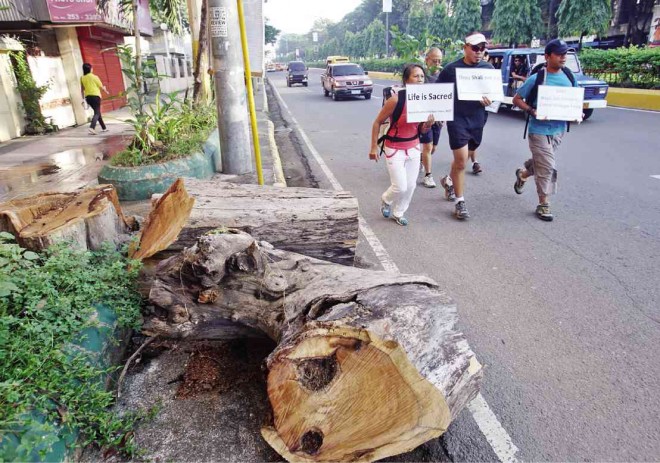
MEMBERS of National Coalition to Save Trees headed by running priest Robert Reyes (left, back row) pass by a cut tree on the Osmeña Boulevard sidewalk as they run from the Capitol grounds to the Archbishop Residence on D. Jakosalem Street to save the trees in Naga City, San Fernando town and Carcar City. JUNJIE MENDOZA/CDN
CEBU CITY—At least 30 Cebu mayors want Environment Secretary Ramon Paje to reissue an order to cut 84 trees, many of which are century-old, in two cities and one town in southern Cebu province.
During the general assembly of the League of Municipalities of the Philippines-Cebu (LMP-Cebu) on Friday, the mayors agreed to pass a resolution addressed to Paje because they wanted the road-widening project in the south to continue.
Tuburan Mayor Democrito “Aljun” Diamante, LMP-Cebu chapter president, told a news conference that the trees should not be an obstacle to development.
“There are other areas where we can plant the trees but these should not be on the roadside. These trees [along the highway] can prevent the development of an area,” Diamante said in Cebuano.
The 84 trees are among the 154 earlier identified to be cut or earth-balled to give way to the 15-kilometer road-widening project that covers San Fernando town and the cities of Naga and Carcar worth P1.025 billion from the pork barrel funds of former Representatives Eduardo Gullas and Tomas Osmeña.
The widening was stalled when the Department of Environment and Natural Resources (DENR) required the Department of Public Works and Highways to conduct a public hearing due to the opposition to the plan to cut down the trees.
But the DENR inspected the 88 old trees in July when two century-old trees separately fell in San Fernando and Carcar.
The agency then declared these trees as “diseased” and “rotting” and recommended their cutting.
Four century-old trees in Naga had already been cut when Paje ordered to stop the operation due to massive opposition from environmentalist groups.
The mayors earlier planned to file a class suit against the DENR and Cebu for stopping the cutting of trees because, according to Dumanjug Mayor Nelson Garcia, the trees should be chopped down, regardless of their health condition, to give way to “progress.”
Diamante said the mayors decided to settle the matter diplomatically by asking Paje to reconsider his decision because the trees could be planted anywhere but the highway where falling trees could pose danger to passing motorists.
He stressed that the local governments, and not the environmentalists, would be the ones to respond in cases of emergency brought on by falling tress.
Diamante said stopping the cutting of trees was “antidevelopment.”
“We could always plant trees but we should not prevent the development of a place. How will we bring products from the province to the city if we have not widened the roads just because of these sick and old trees?” he asked.